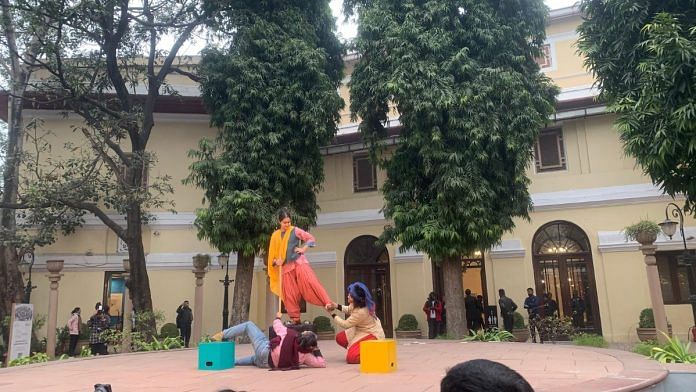New Delhi: Nobel laureates’ data-driven techniques are trying to be fun. For its 20th anniversary, the Abdul Latif Jameel Poverty Action Lab, founded by Nobel laureates Abhijit Banerjee and Esther Duflo and better known as J-PAL, switched things up. Academic research, notorious for gatekeeping and inaccessibility, was refashioned for mass consumption. Research on gender was made into a play, and the perils of poor air quality were expressed through mundane objects. Ambient air pollution was represented through a shirt wrapped in plastic.
The social sciences met the arts, and Delhi’s Bikaner House became an informal, three-dimensional learning space.
To conduct its research, J-PAL uses RCTs (randomised controlled trials), a method of study that previously belonged to the medical realm. From the formation of data sets to the ostensibly cold division of communities into control and treatment groups – J-Pal brought it all into the social sciences.
The group’s ultimate aim is poverty alleviation, but according to Tanya Jha, a communications manager, it is more about “understanding human behaviour” and finding what ticks. Although, even as their work claims to be people-oriented, it’s always belonged to economists and public policy professionals. And the exhibition claimed to open these results up to a new audience.
A neatly packaged play
A play by Aagaaz Theatre Trust, a group of theatre practitioners in Delhi, narrated the story of a young woman in an unnamed village who wants to contest Panchayat elections and eventually become the village pradhan. Predictably, her mother emerges as an obstacle and wants her to stay home. She has a staunch compatriot and supporter in a close male friend. Together, the duo convince her of the advantages of elections.
The play, part of a successful J-PAL project that began in Haryana, is neatly packaged, a quick interpretation of the value of gender sensitisation campaigns for school-going children. The cause is there, as is the effect. Art is known for its nuances, the complexities, the lack of resolution. But the play, like J-PAL’s research, hinges on resolution and result.
The play swiftly addressed unwieldy subjects – such as the need for increased political participation of women, the value of gender sensitisation at an early age, and the shapes patriarchal constructs take on. But equally visible were its neat conclusions.
Also read: Gopal Ghose was lauded by Nehru, Tagore. His art depicted Bengal famine, Partition and grief
Math games, different sectors
The exhibition was divided into ‘sectors’ – a different room for each of J-PAL South Asia’s arenas. Climate, health, education and gender had especially dedicated spaces. Lines of chips, as presented in ‘corner-shops’ demonstrated how liberating they had been for women. An interactive game showcased the biases that take centre stage while choosing a partner.
The ability to solve simple math puzzles appears to be innate, but once privilege kicks in, it’s subdued for some, and enhanced for others.
J-PAL successful projects – a model of how control and treatment groups are selected, and in the case of TARL (Teaching at the Right Level), how projects are applied to other countries – were spread across Bikaner House, known more for art in its conventional mode, and cultural dos. The words “creative” and “innovative” were used generously. “The aim is to showcase our research in a creative and engaging way,” said a gender policy specialist at J-PAL South Asia. “Evaluations of performance theatre as a means of intervention have been done.”
(Edited by Zoya Bhatti)



